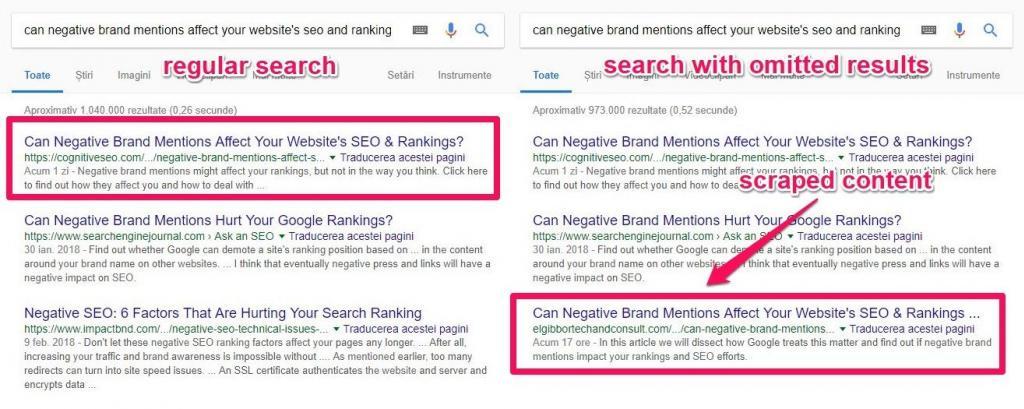Content syndication can be a great way to drive traffic to your site, get exposure and maybe even improve you rankings. But, on the other side, it can also turn out to be devastating, if played wrong.
The main concern when it comes to syndication is duplicate content. Will Google penalize you if you take other people’s content and place it on your own website? Will it hurt your SEO? Then, there’s also a concern regarding rankings. If you have a small website, will you be able to rank above the authoritative sources you’ve posted your content on?

- What Is Content Syndication?
- Does Content Syndication Affect SEO & Traffic?
- Should Syndicated Content Be Indexed or Not? Will It Outrank the Original Content?
- Dealing With Stolen Content
- An Alternative to Content Syndication
Well, there are many variables and, depending on each case, you should take proper action. In this article, we’ll try to cover as much as possible and help you decide whether content syndication will work for you or if it’s better to stay away from it.
What Is Content Syndication?
Content syndication is the process of giving other publishers the right to republish your content. It can often happen in all types of media and it isn’t restricted only to web. Content syndication was popular in TV, radio and print as well.
So, in a nutshell, content syndication is when you publish your content on other websites. Why would you do that? Well, there could be a number of reasons, but the biggest one is gaining exposure and, potentially, traffic.
You can also publish other pieces of content on your website, in order to attract visitors to your website and make revenue through ads. It goes both ways.
Syndication vs. Guest Posting
If you thought this kind of sounds like guest posting, then you’re right. There are some similarities. However, there are some differences that set them apart pretty far from one another.
Both guest posts and syndicated content have kind of the same purpose: to bring traffic and backlinks to your website. This way, they’re similar. But, for once, guest posts are unique content (or at least they should be) while syndicated content is duplicate content. You: Wait what? Duplicate content? Isn’t that like bad? It depends. But we’ll talk about this soon enough, so keep reading.
Content syndication is also a lot more scalable guest posting. After all, there are only so many guest posts you can write in a month. With syndication, you also get to post the content on your website and own it. With guest posting, you don’t get that luxury. So, if a guest post is really successful, other websites will benefit from the traffic.
Content syndication is easier to scale than guest posting and you also have the advantage of owning the content.
However, it might be a lot easier to land a guest post somewhere than to syndicate content, because everybody loves unique content.
Does Content Syndication Affect SEO & Traffic?
When it comes to publishing your content somewhere else or publishing other content on your website, there are a lot of concerns that people have. How will this impact their rankings, traffic and image? Will it help you rank higher and get more traffic, or will it affect your rankings negatively?
Duplicate Content, Backlinks & Penalties
The biggest concerns people have when syndicating content are duplicate content and backlink penalties. Let’s go through both of them to find out more.
Duplicate Content Penalty:
It’s true, syndicated content is considered duplicate content. However, the duplicate content penalty is just a myth. Google doesn’t penalize websites for duplicate content. At least, not the way you think.
So, there you have it. Google doesn’t have a duplicate content penalty. It does however, penalize websites that scrape content or spam the web using duplicate content. If they provide no value at all, then Google might take manual action. But that’s not really about duplicate content as much as it is about spam.
However, Google likes it when you provide unique content and specify your duplicates. If there are 5 URLs with the same content, which one should Google rank? If you don’t help the bot, it will decide on its own at some point and send the other pages into the omitted results. You’re better off with unique content.
Google simply knows that users like diversity. They don’t like to see the same content ranking over and over again. So if you want to call Google’s omitted results a penalty, fine. However, a general website penalty for duplicate content is just a myth.
Link Penalties: Dofollow or Nofollow?
What Google always advises is to avoid any sort of scalable link schemes. Content syndication kind of fits that criteria, so you should definitely be careful where you syndicate your content. Make sure the websites you post on and get links from are decent.
If you set partnerships with multiple publishers, then it’s probably a good idea to mark your backlinks what a nofollow tag. That way you’ll be sure that nothing bad can happen, especially if you’re paying for the post. And, just in case you’re wondering, nofollow links are useful for SEO.
Using nofollow links back to your site will ensure that you won’t get penalized. Nonetheless, if the offer isn’t incentivized, dofollow links are good.
However, if some webmaster reaches out to you to ask your for permission to republish your content because they think your content is awesome, feel free to get a dofollow link from them. As John Mueller mentioned above, as long as you’re not spammy, you shouldn’t worry.
When You Syndicate Other Websites’ Content
If you’re planning on publishing other people’s content on your website, then there are some things you need to consider.
First of all, you probably won’t be ranking that content in Google. You therefore need another source of traffic for the content, otherwise it won’t be of much help. If you have social media following or generating traffic some other way, then you shouldn’t have an issue. Second, the owners of the content might have different requirements, such as highlighting their websites at the top of the post, requesting a backlink or even a canonical tag.
Some websites follow this business model. They just republish great content from around the web and drive traffic to their site with it. However, if you think that’s easy-peasy to do, also consider that it takes years and a lot of hard work to build an audience and generate traffic to the website without spending more than earning.
Pros:
- You don’t have to write content
- You get to publish great content from multiple sources
Cons:
- Owners might ask for canonicals, so you won’t drive traffic from Google
- Can get into copyright issues if you don’t ask for permission
- Google might think you’re spamming or using an autoblog plugin if you overdo it
How to do it the right way:
If you’re planning to syndicate content on your site… Wait, let me rephrase that. If you want to syndicate content on your site, you need a plan. You’ll need to know your sources, make sure that they agree with you republishing their content and also make sure that you know where you’ll generate your traffic from. Scaling this with autoblogs is a bad idea, as it can get you into some legal issues as well as penalize your domain for web spam.
When Other Websites Syndicate Your Content
Getting your content on other websites is great. You can drive traffic back to your website and establish authority. However, it’s not as easily done as said. In order to get featured on worthy websites, you need worthy content. You should be posting quality content anyway, so this shouldn’t be an issue. When you give away your content, if someone (hypothetically) shares it somewhere you haven’t thought of and gains 10,000 visitors, you won’t get any of that traffic. They will build e-mail lists and make ad revenue on your content.
Make sure that your content is indexed as soon as you post it. You can do this via the Google Search Console, in the Crawl > Fetch & Render section. Once Google fetches and renders the content, you can request indexing for that link. Do this for every post before you start distributing it. If it gets indexed first on another website, you might get into trouble and not be able to outrank it.
You might also notice that people won’t just simply share your content when you pitch them. They will want you to share theirs as well. I post your content, you post mine, right? Well, if you successfully pitch this deal to 10 blogs, they only have to post once, but you’ll have to post 10 different articles on your site. You’ll end up with one popular and original piece of content on your site, and 10 copied, duplicate posts.
Also, Google values one way links more than link exchanges. If you scale link exchanges it might even consider it some sort of link scheme.
Pros:
- Nice way of promoting content and possibly even drive some traffic
- Great way of building authority
- Can get you quality backlinks
Cons:
- People might want to exchange favors or money for it
- You don’t make revenue from ads and can’t build e-mail lists
- There’s a risk you’ll get outranked
How to do it the right way:
Once you have your great piece of content, first make sure it’s indexed before you pitch. You want to be the first, so that Google doesn’t think you’re the one copying content. Then you need to pitch it to quality websites in your niche. Make sure you’re able to get a rel=”canonical” back to your original post. If not, at least get a backlink, be it follow or nofollow.
A good place to start is Medium. You can easily republish your content there, because Medium offers you the option to add a canonical URL. This way, if the medium post gets to the top of Google using its authority, your website will show instead.
Press Releases
Press releases are also a form of syndicated content, but they act a little bit differently. First of all, they’re often times paid, at least on the web.
Another difference is the fact that you don’t post it on your site. This means that you won’t be facing the duplicate content issue. However, it’s not excluded for news publishers to request original content on their website, meaning that the press release will be more like a guest post rather than syndicated content. Some publishers will write their own content, which is great, but others will ask you to do it.

Since you’re scaling this, you should definitely use nofollow links, as Google recommends. The posts are about you, anyway, so you’ll probably get more traffic than with regular syndicated content, as you can pitch your product/service or website right at the beginning of the post.
However, a canonical tag doesn’t make sense here, since the content isn’t duplicate. The link will help, but you could still get outranked if your press release gets posted on a high authority website. To avoid this, simply optimize the press release for a slightly different keyword than the main ones you want to target with your website.
Should Syndicated Content Be Indexed or Not? Will It Outrank the Original Content?
Some time ago, I asked John Mueller for advice, as someone took my content and posted it on their website before I even had a change to get it indexed.
We just rank the pages, we don’t decide who owns the content. If it’s a legal issue, you might want to get legal advice instead..
— John ☆.o(≧▽≦)o.☆ (@JohnMu) September 22, 2017
John’s answer was kind of disappointing back then. Unless the webmasters would agree to link to me or add a canonical link, there was pretty much nothing to do except a copyright strike.
However, recently, I’ve also found this piece of information:
So… Apparently Google does care about which content was indexed first. Theoretically, as long as your site has been indexed, it should be ranking first. So, right after you post, just use the search console to index it quickly and you’ll be fine.
Well… not so fast. This might work if you’re already a somewhat established website, but if you’re site is 5 days old and you get to republish your article on CNN, don’t expect to rank above it.
We’ve had some scraper site outrank cognitiveSEO in Google Image Search with our own featured image. How did we find out? Because Google picked it for an answer box. We took a look at the URL and it wasn’t ours. I can’t recall if it was indexed before us, but luckily, Google figured it out and things got fixed pretty quickly. However, this proves that you can sometimes get outranked when syndicating content.
Here’s another example of someone “syndicating” our content. However, Google was smart enough to rank us at the top and show the other site only in the omitted results. The scrapers removed all the backlinks from the post and didn’t even mention the source. The only links we’re getting from it (which are probably harmful anyway) are the ones from the image sources.

As long as you’re genuinely building relationships and actively doing things to benefit the users, there shouldn’t be an issue with syndicated content.
Even though there are risks involved, syndicated content should be indexed, otherwise Google would never know that the original source is so popular.
Dealing With Stolen Content
Stolen content is syndicated content that doesn’t have your permission. Often times, your content is scraped by bots and automatically published on various websites, as mentioned above.

However, webmasters might also republish your content without permission. This shouldn’t bother you too much if you’re ranking high already. However, if you’re not, it can potentially harm you. I’ll share a personal story with you:
Once upon a time, when I first started my SEO blog in Romanian, I wrote a very successful blog post that drove a lot of traffic to my site on the first day. Because I got so excited, I forgot to submit it for indexing. A big publisher liked it so much that it reposted it.
At first, I was kind of proud and happy, even though they didn’t ask me if I agreed, but then I realized my mistake. In a matter of days, their content was ranking on page 1 of Google for the keyword I targeted and my article was nowhere to be found. That Tweet, above, to John Mueller was actually about this situation. Luckily I managed to get a rel=”canonical” from them and soon Google ranked my content instead of theirs.
However, regarding the cognitiveSEO issue where some scraper site was ranking images above us, we actually couldn’t get in touch with them, so we instead decided to contact their hosting provider and report the copyright infringement. You can find out their hosting provider with tools like Who Is Hosting This.
So, you have to first try and reach out to see if you can get a backlink or canonical URL. If not, you can also ask them to remove your content, due to copyright. Reporting this to their hosting provider can get them suspended, so they will probably comply. However, if everything else fails, you can also file a DMCA Report using this tool from Google. Select See more products, then Web Search.
An Alternative to Content Syndication
I haven’t mentioned this yet, but the most important part in content syndication is building relationships with other webmasters. And you know what? You don’t have to post their content on your site. You can simply share it on your social media account. They will eventually share yours as well.
Building relationships with others can be extremely rewarding. And what better way to build relationships than to recommend their work? However, make sure you genuinely enjoy their products, services and content. People will eventually figure out if you try to kiss everyone’s… you get the point. They won’t like it. And don’t just share their content. Engage. Build a connection.
Social media is a great way to build connections and share relevant content without having to deal with any of the complications of content syndication.
If you don’t feel comfortable sharing your competitor’s content, you can always take a step down in your niche. For example if you’re in the SEO field, you might share content within the digital marketing field. If you’re into bikes, you can share sports (roller skates, scooters) or outdoor activities.
Conclusion
In the end, it’s a personal decision, if not a matter of business models and website purposes if you want to start syndicating content. Content syndication can be a great way to promote your content and make a name for yourself. However, you must also embrace the fact that content syndication revolves around an audience rather than search generated traffic and if you overdo it, you might get in trouble.
How about you? Have you ever used content syndication as a way to promote your blog? If yes, how did it go? Did you gain traffic? Were you ever outranked? Let us know in the comments section, we really want to find out!
The post Does Syndicated Content Work? Will It Help or Will It Hurt Your SEO? appeared first on SEO Blog | cognitiveSEO Blog on SEO Tactics & Strategies.
Does Syndicated Content Work? Will It Help or Will It Hurt Your SEO? posted first on http://nickpontemarketing.tumblr.com/
No comments:
Post a Comment